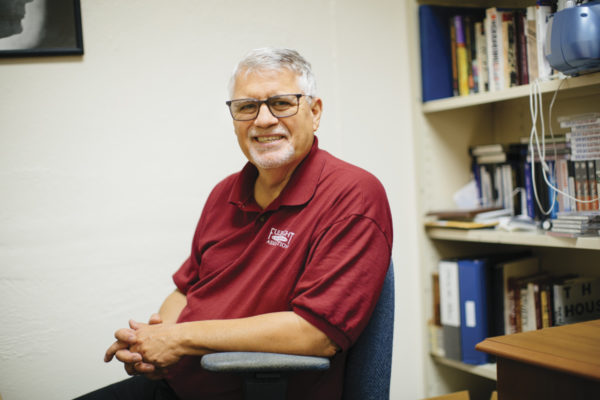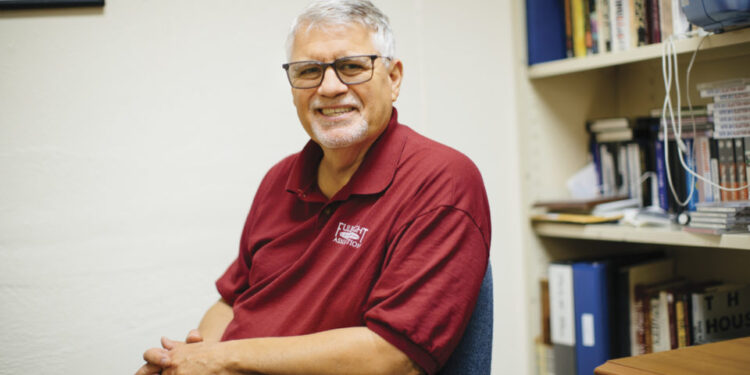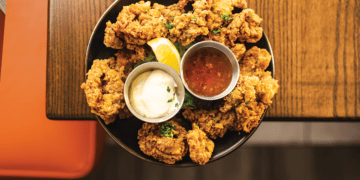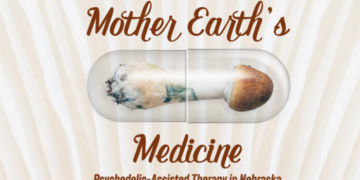I’ve been enamored of traveling for a long time, I just didn’t start until I was fairly old,” says University of Nebraska at Omaha journalism professor Chris Allen.
He first travelled overseas to Russia for a reporting job in his 30s, but his job at UNO has enabled him to further his passion. The Middle East, where he has spent much time teaching and developing academic relationships, is a particularly favorite region. Allen travelled to Afghanistan in 2010, and has returned several times. He has been working with universities there to help expand their journalism programs.
“Chris was the leading force behind our work with the Afghan professors,” says UNO School of Communication Director Hugh Reilly. “He oversaw the curriculum and made sure all the details were covered. At the completion of our program, the University of Kabul and Balkh University will be the first two universities in all of Asia that offer a major in communication studies.” Reilly says that many Asian universities offer degrees in journalism, but these two universities will be the first to offer degrees in communication studies.
While Allen enjoys traveling and working in Afghanistan, he particularly enjoyed a trip to the Middle East during the 2011-2012 school year. He traveled on a Fulbright scholarship to teach a journalism class in a country most people know little about, Oman. Allen has a friend who lives in Oman, and decided to apply for the scholarship there after hearing his friend’s glowing reviews of the country. Once Allen learned that his application was accepted, his friend give him books to read about the country, and described it as open and friendly.
He taught at Sultan Qaboos University for nine and a half months. His wife, Elaine, traveled to the exotic locale with him.
“The great thing about going someplace…for that amount of time is that you have to become part of the society,” Allen says. “You have to do grocery shopping, you have to buy clothes, you have to get your hair cut. You have to do things in the Omani society, which is Arabic and Muslim. You have to learn how to live.”
Although the Omani society was different from American society, Allen says he felt as though he belonged there from the beginning.
While in Oman, Allen taught two graduate courses in journalism and mass communication, as well as an undergraduate course in radio and television. His favorite part of teaching there was the students’ sense of humor, but their drive and ambition did not fall short.
“They were so hungry for knowledge,” Allen says, noting that the women, in particular, were eager to learn. “They had opinions on things, they were always prepared, they spoke up, they were really fun people to have in classes.”
One challenge for Allen was coaching the students to be better writers. As the students he taught were nonnative English speakers, it was difficult for them to write academic papers in English.
“One of the battles I fought was plagiarism,” Allen says. “The funny thing is, it’s very obvious. Their English is not very good, you know. They would be writing these substandard paragraphs and all of a sudden it was absolutely pristine, perfect, academic English with no quote marks around it. I would warn them that they would have to change those passages. And in fact, one student did flunk my class because he just did not change the passages. I was heartbroken about that.”
Despite failing one student, he enjoyed nearly every experience in Oman.
“I learned to eat with my hands,” Allen says. “The guys in the room asked me if I wanted a spoon to eat with, and I had only been there about a week or so. I smiled and said ‘no, I will eat with my fingers, but you can’t laugh at me.’ And of course I did spill some, but I was watching how they ate and I learned how to do it.”
Allen now uses his own experiences through traveling in the classroom with his students in Omaha.
“The content that I can bring back into the classroom has been dramatic,” Allen says. “The way that things are done differently in some countries—censorship, there are examples of innovations, there are examples of good media and bad media…There is more than one way to do things, and not all of the other ways to do them are bad.”
His adventure to Oman quickly became a passion. Allen has now taken two groups of students to see the country. He believes that traveling in one’s youth can instill a lifetime love of exploring the world.
“All the students I take say ‘that changed my life,’” Allen says.
Allen explains that the press can be inaccurate about Muslim and Arab cultures, as they often cover the violent aspect of these groups. He describes Oman as a “wonderfully peaceful, tolerant, open country,” with warm and accepting people.
“We were walking back to the car [one day] and this young man steps out from his compound and he had three children with him,” Allen says. ‘He looked at us and he said ‘Hello, where are you from?’ I said ‘We’re from America,’ and he said ‘Oh America, please come in for some coffee.’ And when you go in for coffee (and we did) you get coffee, and water, and dates, and oranges, and apples, and grapes, and nuts, and juices, and I mean it’s just on and on and on. People were so kind. It changes your life, it changes your whole outlook on all of those things.”
In fact, Allen loves Oman so much, he says if he could live anywhere in the world it would be there. He describes the country as being beautiful and modern, with internet, cellphones, highways, and grocery stores.
Allen plans to travel to Pakistan in November. He also takes a group of students to London each year, and hopes to spend time in Australia at some point. The wish list of travels continues.
“I dread the day when I can’t travel,” Allen says. “I just dread that day, when my body gives up on me, or when my mind gives up on me.”
In the meantime, Allen plans to continue taking an interest and fascination in seeing new things and experiencing new places.
“I haven’t done nearly enough,” Allen says. “I wish I had started sooner. It’s just so important to me to learn other cultures, to hear other languages, to eat other food.”
This article was printed in the October 2019 edition of Omaha Magazine. To receive the magazine, click here to subscribe.














